Israel Travel Information
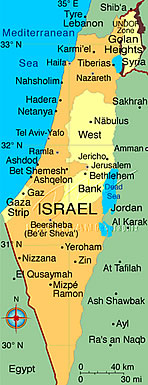 About Israel
About Israel
A colorful and fascinating country with more touring sites, more beauty and more interest packed into every square mile than any other destination in the world. This is the place where the stories we grew up with happened and where events that have affected humankind took place. The Bible and its world are alive and living here, to be seen and experienced in Jerusalem and throughout the country. Israel is a fun-loving amalgam of past and present. Crusader forts, Roman ramparts and Turkish towers dot the landscape, so do discos, modern shopping centers, high rises, luxury international hotels and fantastic beaches.
Israel lies at the crossroads of Europe, Asia and Africa. Geographically, it belongs to the Asian Continent. It is about 290 Miles long (470 KM) and 85 miles wide at its widest point (135 KM). Its total area is 22,072 Sq KM, smaller than the area of the state of New Jersey.
Israel is also on a climatic crossroad, which is a transitional area between a temperate and arid climate. The Southern and Eastern areas of the country have an arid climate, while the other areas are Mediterranean climatically. Due to this climatic formation, rainfall is highly variable from year to year and in different areas of country.

Major Cities
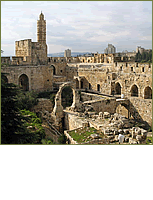 Jerusalem
Jerusalem
Jerusalem is Israel’s capital and its largest city in both population and area, with 747,600 residents over an area of 125.1 square kilometers (48.3 sq mi) if the disputed East Jerusalem is also included. Located in the Judean Mountains, between the Mediterranean Sea and the northern tip of the Dead Sea, modern Jerusalem has expanded outside the Old City. Jerusalem’s history goes back to the 4th millennium BCE, making it one of the oldest cities in the world. Jerusalem has been Judaism’s holiest city and the spiritual center of the Jewish people since the 10th century BCE. Although Jerusalem is known primarily for its religious significance; the city is also home to many artistic and cultural venues such as the Israel Museum, the Islamic Museum, Yad Vashem, Israel Philharmonic Orchestra and many more.
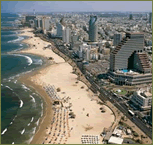 Tel Aviv-Yafo
Tel Aviv-Yafo
Aviv-Yafo, is the second-largest city in Israel, with an estimated population of 390,100. The city is situated on the Mediterranean coast with a land area of 51.8 square kilometres (20.0 sq mi). A metropolitan city and Israel's economic hub, Tel Aviv is the country’s wealthiest city, where the Tel Aviv Stock Exchange and many corporate offices and research and development centers are located. It features beaches, bars, cafés, upscale shopping, great weather and a non-stop nightlife. Thanks to its round-the-clock cosmopolitan lifestyle, Tel Aviv is a hugely popular tourist destination that lives up to its reputation as a "Mediterranean city that never sleeps".
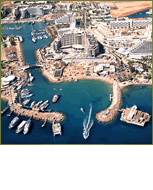 Eilat
Eilat
Eilat is Israel's southernmost city, a busy port as well as a popular desert resort on the Gulf of Eilat, and home to 46,900 inhabitants. The city is adjacent to the Egyptian village of Taba to the south, and the Jordanian port city of Aqaba to the east. Eilat's arid desert climate is moderated by proximity to a mild sea where temperatures often exceed 40 °C (104 °F) in summer and 18 °C (64 °F) in winter. The city's beaches, nightlife and desert landscapes make it a trendy destination for domestic and international tourism. Leisure and tourism are Eilat's prime sources of income and the resort offers a wide range of accommodation - from hostels to luxury hotels - as well as inviting tourist to experience its many unique attractions and recreational options - all within a 50 kilometer (31 mile) radius. Bird watching, camel tours, scuba diving, Kings City, Timna Valley Park, are just some of the highlights visitors enjoy.
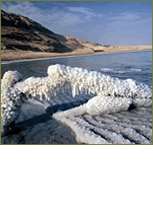 Dead Sea
Dead Sea
The Dead Sea is a unique geological phenomenon – a salt lake that is 422 metres (1,385 ft) below sea level, and the lowest point on the surface of the earth (on dry land). Lying between Israel, the west bank of the Jordan River, and the Kingdom of Jordan on the east, the lake is 67 kilometres (42 miles) long and 18 kilometres (11 miles) wide at its widest point. Its micro-climate features year-round sunny skies and dry air with low pollution. Summer temperatures average between 32 and 39 °C (90-102 °F) and winter temperatures range between 20 and 23 °C (68-74 °F). The mineral content of the Dead Sea is very different from that of ocean water and its natural buoyancy means anyone can float effortlessly in its waters. The region's climate and the unique conditions created by its low elevation have made it a popular center for a range of therapies such as Heliotherapy and Thalassotherapy, and Dead Sea mud, believed to have special healing, is widely used in cosmetic products. Masada National Park, Qumran National Park, Saint George and Mar Saba monasteries are only a few of the fascinating sites close to the Dead Sea.
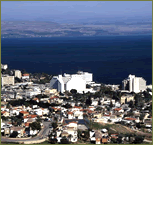 Tiberias
Tiberias
Tiberias is an historic town on the western shore of the Sea of Galilee, named in honor of the Emperor Tiberius. Established in about AD 20 it was about a decade later, around 30 C.E. that Jesus came to the northern shore of the Sea of Galilee. It was here that several miracles occurred and where Jesus walked on the waters of the lake. As Christianity strengthened, Tiberias and its surroundings witnessed the construction of many churches; today, there are several archeological sites well worth visiting in and around the area. From Herod Antipas, through the Middle Ages, the Ottoman Empire, British Mandate to the modern era, Tiberias has been the scene of major events and dramas. It is also famous for its hot springs featuring 60 Celsius water infused with minerals reputed to have unique therapeutic qualities and are used in the Tiberias Springs Spa which is highly respected for its health and beauty treatments in the tranquil setting of the Sea of Galilee. With a climate that is very hot and dry in summer and, cold and wet in winter, Tiberias is one of the most popular holiday resorts in the northern part of the country.
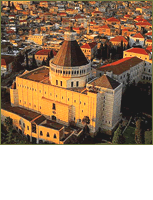 Nazareth
Nazareth
Nazareth is the capital and largest city in Israel’s northern region. It is also the most important city for Israel's Arab citizens who make up the majority of city’s population. In the New Testament, the city is described as the childhood home of Jesus and as such, is a center for Christian pilgrimages with many shrines commemorating biblical events. The Nazareth metropolitan area has a population of approximately 185,000 of which over 125,000 are Israeli Arabs. According to Luke, Nazareth was the home of Joseph and Mary and the site of the Annunciation, where the Angel Gabriel told Mary that she would give birth to Jesus. Nazareth is also where Jesus reached manhood. The many century-old churches in the town include the Church of the Annunciation, the Eastern Orthodox Church, the Melkite Greek Catholic Church, the Church of Christ and more - most of which are located in the city's Old Market.

Useful Information
Appropriate Dress
Appropriate dress in Israel is casual and comfortable. Visitors to the holy places, even in the summer, must ensure that knees are covered (i.e. no shorts) and upper arms too (i.e. no sleeveless tops, particularly for women). If you prefer to wear shorts and/or sleeveless tops, always have a “modest” alternative as a cover when necessary. Hats are essential from April through September. Don’t forget your sunglasses!
Banks
Banks are generally open from Sunday to Thursday between 8.30 a.m. and 12.30 p.m. and on Sundays, Tuesday and Thursdays between 4 p.m. and 6.00 p.m. Most city banks have ATM machines where you can withdraw cash (Usually in Israeli shekels (NIS), not US dollars).
Credit Cards and Cash
Credit cards can be used for major shopping items and at some lunch cafeteria places. Cash (US dollars) is very useful - the price of a souvenir can often be reduced by paying cash. It’s worth bringing a stash of $1 bills to stick in your pocket for purchasing small items from street vendors. If you open your wallet next to a peddler, you are in danger of losing both your credit cards and your cash.
Currency
The national unit of currency is the Shekel (New Israeli Shekel, abbreviated to NIS) which is divided into 100 agorot. Notes are in denominations of 20, 50, 100 and 200 Shekels. Shekel coins are 10, 5, 2, 1, and one half. Agorot coins are 10 and 5. You can use US dollars nearly everywhere (except neighborhood grocery stores and local buses), but more often than not, you will receive change in shekels.
Exchange Rates
Exchange Rates vary from day to day. You can change money at your hotel which will give you virtually the same rate you receive at the bank. There are ATMs in the cities, but not always within walking distance of your hotel. You can use your credit card for major purchases. Many enterprises accept the U.S. dollar, but often you will receive change in Israeli currency. So it’s important to be aware of the exchange rate and count your change.
Electrical Appliances
The Israeli power supply is single phase 220 volts at 50 Hertz. Most power sockets in Israel have three pin holes, but many of them will work with double-pin European plugs. Many 4-star (and all 5-star) hotels provide hairdryers and most rooms have 110/220 shaver sockets (to be used for shavers only). Visitors wanting to use traveling irons and other small appliances may need both transformers and adaptor plugs. If you need a transformer or adaptor, the hotel desk may be able to help you.
Food
Israel produces its own fruit, vegetables and dairy products and food in Israel is diverse and high in quality. There is a wide variety of kosher and non-kosher restaurants offering every type of food possible, from falafel and hummus to sushi and Italian. Most restaurants and food stores are open non-stop from morning until late evening, some are 24/7.
Gifts
It’s fun shopping for gifts and great souvenirs of your visit. Jerusalem and Bethlehem specialize in olive wood figures and leather gifts. The Dead Sea area boasts the world-famous Ahava skin moisturizers and Dead Sea Mud – guaranteed to keep you young-looking!! In the Galilee and in Jerusalem, you can find unique jewelry displaying your favorite Bible verses or decorated with ancient Roman glass. Everywhere in Israel, you will find beautiful works of art and hand-made jewelry.
Health and Accident Insurance
Ensure that you have health insurance coverage. Should the need arise, ask your guide to help you make contact with a clinic or doctor. Most major hotels have a doctor on call. Magen David Adom (the Israeli equivalent of the Red Cross) provides 24-hour emergency medical service in most of the urban centers. Magen David Adom also provides ambulance service to the nearest emergency room. Make sure to get copies of the appropriate medical forms so that your American carrier will reimburse you.
Bring all the medicines you need. As a precaution, carry the generic names of your medications with you; pharmaceutical companies overseas may use different names from those in North America.
It is advisable to buy travel insurance that includes emergency evacuation with accompaniment. For example, if you trip while photographing and break a leg, getting home can be complicated and expensive without the appropriate insurance.
Hydration
During summer, it is especially important to drink lots of water. Although tap water in Israel is of good quality and safe to drink, you may not be used to the high mineral content. Bottled natural spring water is available everywhere and the main point is to drink!
Internet Access
Many hotels provide Internet stations for a fee. Some offer free Wi-Fi and others for a fee. There are also Internet Cafes in the major cities.
Kosher dietary laws
Most hotels observe the laws of Kashrut – which means they do not serve meat together with dairy products. For example, they will not offer butter or cheese when serving you beef. It also means that you are not allowed to bring your own food into the hotel dining room.
Language
Hebrew and Arabic are Israel’s official languages. However, English is also widely spoken and you will see that most highways, streets and storefront signs are in English as well as in Hebrew and Arabic. Recently Russian has become widespread.
Medical Services
Medical care in Israel is modern and as advanced as in North America. If you need emergency medical services, Magen David Adom (the Israeli equivalent of the Red Cross) provides 24-hour service in most of the urban centers. Magen David Adom (dial 101) also provides ambulance services to the nearest emergency room. If you take prescription medication, it is advisable to bring enough to last the duration of your trip.
Newspapers
Israel boasts two daily English newspapers, the Jerusalem Post and Haaretz, available every day except Saturday. They can be purchased at the hotel shop or at a local newsstand.
Passports
A passport valid for at least six months past your scheduled return date is required for travel to Israel. If your passport will expire within this period, you should apply for a new passport a couple of months prior to your trip.
Make a photocopy of your passport’s identification page and keep it separate from the original when you travel. For added security, leave a photocopy with a friend or relative at home. This will expedite matters if you lose your passport. If you do lose your passport, you will have to go to your consulate or embassy (which closes on the weekends). To avoid a major hassle, keep your passport in a safe place on your person, or locked in your hotel safe.
Phones
Direct dialing from your hotel room could be costly. Phone credit cards are cheaper. You may access AT&T, MCI and Sprint for overseas calls from pay phones by dialing a 177 (toll-free) number. It’s best to check your service number before you leave home.
Cell phones are available everywhere; you can rent a cell phone before departure from the U.S, upon arrival at Ben Gurion Airport, or via the concierge at major hotels in the large cities.
Shopping
Shopping in Israel is a delight with large shopping malls in almost every city, as well as colorful markets and bazaars, all of which offer imported and locally made items.
Most stores are open from Sunday to Thursday between 9:00 in the morning and 19:00-21:00 in the evening. Stores close at midday on Friday and open again on Sunday morning.
Taxis
Local and intercity taxi services are available to and from any point in the country. Fares within the cities are charged according to the meter. The fares for intercity taxi service are standard and are set by the Ministry of Transportation. It is recommended to verify the fare before boarding the taxi. Taxis can be ordered by telephone from a local taxi station or by waving your hand at a passing taxi on the street.
Drivers must operate the meter for trips within the city. Do not let the driver convince you to agree on a price ahead of time if you are not familiar with the rates!
Time Zone (GMT+2)
Israel is seven hours ahead of EST and ten hours ahead of PST. When it is 10 a.m. in Los Angeles it is 8 p.m. in Jerusalem and throughout Israel. Israel switches to daylight saving time at the end of March which usually lasts until the High Holidays in late September.
VAT - Value Added Tax
There is a 16.0% value added tax (VAT) on most goods and services in Israel. This is Israel’s equivalent to the U.S. sales tax. Upon making a purchase of $100.00 or more, at a gift shop that carries an agreement with the VAT authorities, fill out a form at the shop and have it stamped there. Prior to departure at the airport, upon presenting this form and the purchased item, you will be eligible for a refund of 15.5% minus transaction charges. Do not pack these gift items in your check-through luggage. They should be kept in your hand luggage along with the special VAT form you receive from the merchant.
Weather
From April to October, Israel enjoys long, hot and sunny summers, with higher levels of humidity along the Mediterranean, in the valleys and around the Sea of Galilee. November to March is the rainy winter season with total annual precipitation ranging from 20-30 inches (50-70 cm.) in the north to about an inch (2.5 cm.) in the far south. Hot, humid summers and mild, wet winters dominate on the coastal plain. Dry, warm summers and moderately cold winters with rain and occasional light snow are characteristic of the Golan Heights. The Jordan Valley enjoys hot, dry summers and pleasant winters; and semi-arid conditions with warm to hot days and cool nights in the south.

Online Calendar
To view Jewish and National holidays in Israel for current and future years, click here.